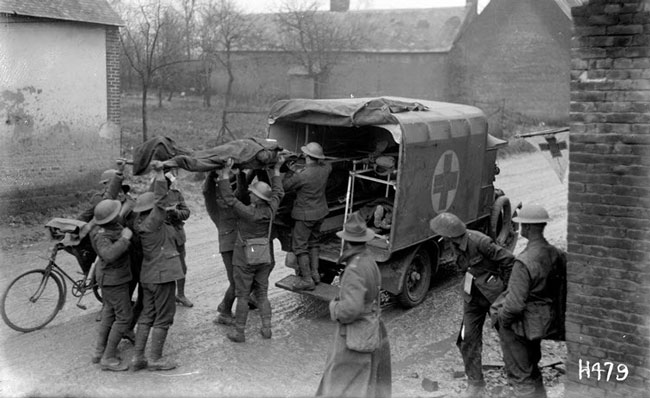 Tuesday 30 October 2018 10:42am
Tuesday 30 October 2018 10:42am
Wounded First World War New Zealand soldiers being placed in a motorised ambulance, France (6 April 1918). Courtesy of: Alexander Turnbull Library, Wellington, New Zealand. Reference Number: 1/2-013096-G; Photographer: Henry Armytage Sanders.

Professor Nick Wilson
World War I cast such a long shadow over New Zealand that the health and social impacts continued through to the next generation, public health researchers say.
A study reviewing all of the health impacts of the First World War on New Zealand is published today in the Australian and New Zealand Journal of Public Health. This date is almost exactly 100 years after the last Kiwi soldiers were killed in action in the first week of November 1918.
Lead author Professor Nick Wilson of the University of Otago's Department of Public Health in Wellington, says the conflict cast a very long shadow – with health impacts that sometimes lasted until the eve of the new millennium.
The 1914-18 war killed more than 18,000 New Zealanders and wounded 41,000. But Kiwi soldiers continued to die long after Armistice Day in 1918, with veterans succumbing to physical wounds, or dying prematurely when mental illness pushed them towards alcohol abuse or suicide.
The physical effects were lifelong for those who were amputees, or who suffered permanent lung damage from poisonous gas exposure, Professor Wilson says. Some soldiers returned from the war with gonorrhoea or syphilis, posing risks to their sexual partners back home in New Zealand.
There is evidence that the health impacts on the families of military personnel continued to be felt by the following generation, Professor Wilson says.
“We know from modern information that when a woman is widowed when she is pregnant, the shock can impact on the developing fetus which can then cause a reduced long-term life span as an adult.”
Another one of the study authors, Professor Glyn Harper, of Massey University says the First World War was probably the greatest destroyer of New Zealand families ever.
“It generated many widows but also killed sons who were needed to keep family farms and businesses operating.
“While the 1918 flu pandemic killed 9,000 New Zealanders in two months in late 1918, this war caused more than double that number of deaths overall – and these were particularly men in their 20s and 30s.”
One hundred years later, the authors say there are still gaps in our knowledge of the health impacts of the war. New Zealand researchers are, however, very well placed to do further research because of the digitisation of military files – which are now available online.
While there is still more to learn, it is already clear that from a health perspective New Zealand paid a high price in health terms for its part in this war, Professor Wilson says.
For further information contact:
Professor Nick Wilson
Department of Public Health
University of Otago, Wellington
Tel 04 385 5541 ext 6469
Email nick.wilson@otago.ac.nz
Cheryl Norrie
Communications Adviser
University of Otago, Wellington
Mob 021 249 6787
Email cheryl.norrie@otago.ac.nz
Electronic addresses (including email accounts, instant messaging services, or telephone accounts) published on this page are for the sole purpose of contact with the individuals concerned, in their capacity as officers, employees or students of the University of Otago, or their respective organisation. Publication of any such electronic address is not to be taken as consent to receive unsolicited commercial electronic messages by the address holder.
FIND an Otago Expert
Use our Media Expertise Database to find an Otago researcher for media comment.